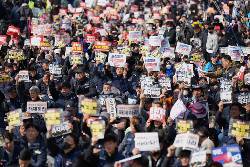SEOUL, South Korea (AP) — South Korea’s Constitutional Court is in session Friday to rule on the impeachment of President Yoon Suk Yeol, four months after the conservative leader threw the country into turmoil with an ill-fated declaration of martial law. It will either remove him from office or restore his powers.
The court was scheduled to issue its verdict in a nationally televised session to begin at 11 a.m. A ruling to uphold parliament's impeachment and remove Yoon from office requires the support of at least six of the court's eight justices.
If the court orders Yoon removed, South Korea must hold a new presidential election within two months. If the court overturns his impeachment, Yoon will immediately return to presidential duties.
Thousands of Yoon's supporters and opponents gathered in downtown Seoul to await the ruling, as police sought to head off potential violence.
Yoon’s declaration of martial law on Dec. 3 lasted only six hours before he was forced to lift it after the liberal opposition-controlled legislature quickly managed to vote it down. Later in December, the assembly impeached Yoon, suspending his powers and sending his case to the Constitutional Court. Yoon is facing a separate criminal trial for alleged rebellion.
Whatever Friday’s verdict is, experts predict it will further deepen domestic divides. In the past four months, millions have taken to the streets to denounce or support Yoon, deepening South Korea’s already severe conservative-liberal division.
By Friday morning, the area surrounding the court was a maze of portable walls, folding fences, fiberglass barricades, and hundreds of police buses and vans — some with their wheels tied together to prevent protesters from moving them — sealing off nearly every road and alley leading to the court. Officers guarded the narrow gaps between vehicles and barricades, directing pedestrians through designated channels, checking IDs, and instructing them to walk only in a straight direction. The military said it plans to heighten its own surveillance posture.
There was a carnival-like atmosphere at an anti-Yoon rally near the old royal Palace that dominates Seoul's downtown. Patriotic music blared from huge speakers as thousands waved banners supporting opposition leader Lee and denouncing Yoon. Some danced and sang along, while others chanted slogans and shook their fists. Some people came dressed in cute blue bear costumes — a protest mascot that uses the opposition's colors — with Lee stickers covering them, or giant plaster heads resembling Lee.
People sat and watched in intense anticipation as the hearing was was shown on a giant screen, cheering at times during the long reading. Many used their phones to record the reading and could be seen leaning forward in intense anticipation.
The most contentious issue at Yoon's impeachment trial was why he sent hundreds of troops and police officers to the National Assembly, election offices and other places after declaring martial law.
Yoon has said he dispatched soldiers to the assembly to maintain order and that his declaration of martial law was a desperate attempt to bring attention to the “wickedness” of the main liberal opposition Democratic Party. But senior military and police officials who were sent to the assembly have testified Yoon ordered them to detain rival politicians and prevent the assembly from voting to lift his order.
Although the period of martial law ended without violence, the impeachment motion accuses Yoon of violating the constitution and other laws by suppressing assembly activities, attempting to detain politicians and undermining peace.
Prime Minister Han Duck-soo, the country’s acting leader, has repeatedly urged the rival sides to accept whatever ruling the court makes.
___
Associated Press writer Foster Klug contributed to this report.
...


